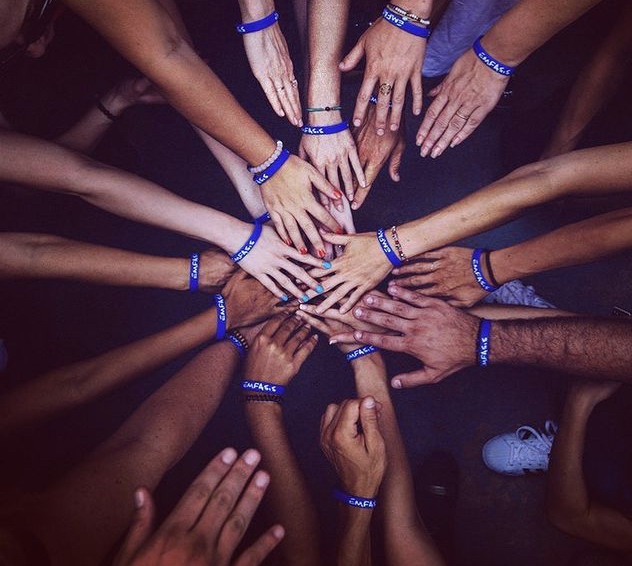Using The Environment to Set Boundaries
Boundaries are very important for creating a sense of security.
Imagine if you were a young child and your yard wasn’t fenced in and was as big as a huge field…
You would keep running and running and at first, enjoy the freedom but then get scared realizing that you didn’t know where you were going and you didn’t know how to get back to home base.
This is exactly what happens for children with no boundaries. At first it feels great to have so much freedom and then it creates feelings of insecurity. Home-base is hard to find and so one attaches to peers as an alternative compass point.
The Three Kinds of Boundary Setting Parents
The Jelly Parents
Parents who have a difficult time setting boundaries are the “jelly” parents. These parents are often really sweet but wobbly with their limits. They may be so concerned about keeping their child happy that they bend the rules. They may be so concerned about their child being included in social activities with friends, that they bend the rules. Parents who have a difficult time setting boundaries may also be overwhelmed with their own mental health concerns or overwhelmed with parenting in general.
The Rock Parents
At the other end of the continuum, are the parents who overly control their kids – the “rock” parents. These parents were usually raised in strict, authoritarian style homes and believe that being strict and controlling is the key to raising “good/well-behaved” kids.
However, the children of this generation are more aware of their rights.
Even if they haven’t read the United Nations Rights of The Child Article 12: You have the right to say what you think should happen when adults are making decisions that affect you, and to have your opinions taken into account, they intuitively know that they have a right to make some of their own choices and give input – to have a voice.
When they’re younger, it may work to externally control them, but in the teen years this usually creates rebellion. If they feel that you are forcing your agenda on them, they will push back. Sometimes, this push-back is done with intention (for example: swearing, explosive melt-downs, spending a lot of time in their room, self-harm, alcohol, drugs, etc.) and other times it is more unconscious and is expressed through mental health concerns such as depression. Depression is sometimes described as anger turned inward. Depression is the extreme feelings of helpless and hopeless and often has genetic links too.
The Bamboo Parents
In the middle of this continuum, we have the “bamboo” parents who are kind and firm. These parents can be flexible. These parents know that limits are important but they are consciously aware of setting boundaries that make sense. These parents use logical or natural limits.
Here are some examples:
If your child refuses to wear a warm jacket on a cold day, nature teaches the lesson vs. a parent forcing the issue
If your child’s bedroom is messy when he/she is young, you let him/her know that before going to the park (or somewhere fun), his/her bedroom needs to be cleaned up and you’re happy to help. This creates a feeling of being along-side your child and teaches good organization and cleanliness habits.
As your child becomes older and knows how to clean his/her room it becomes an independent responsibility. When your child is a teenager, your child will then have had the training to know how to clean his/her room.
If your teen is not cleaning his/her room, and is not depressed, let the environment create the boundary. Living in a messy and disorganized space is not enjoyable and eventually he/she will have to pick clothes off the floor to put them in the wash, because he/she won’t have any clean clothes left to wear! Dirty dishes will become gross and will find their way to the kitchen.
If your teen is depressed then it may work better to offer to help and tidy the room alongside your teen – asking him/her where he/she would like you to put things. If you don’t make judgmental remarks, such as “I can’t believe you’re okay living like this” then he/she will see you as being supportive and in his/her corner which is what your teen needs right now. Facing depression, involves putting one foot forward in a positive direction, and cleaning up one’s bedroom, with support, could be many steps forward, as long as the parent doesn’t lecture, make judgmental remarks or ask too many questions.
If you child doesn’t like the dinner you’ve prepared, you can let him/her know that he/she can get some crackers, cheese, and raw veggies and bring that to the table or eat the home-cooked dinner provided. You can then enjoy eating a family dinner and focus on connection versus trying to force your child to eat something that he/she’s decided not to eat. If you don’t make it a big deal, then the power struggle loses its appeal, and after trying this a few times, your child will probably just join in with the family dinner (*just don’t offer Nutella sandwiches as an alternative or you’ll never get him/her wanting to eat your healthy dinner again!)
As parents, it’s always a fine line trying to decide when to push and when to let our children make decisions for themselves. We always need to take age and stage of development into account too. There are times when we have to make absolute rules but there are other times when we need to let our child make some decisions that he/she might regret but can learn from for future experiences.
If we have too many rules, or a strong parent agenda, our children will feel disempowered, and not trusted.
There is a tremendous amount of power, in saying to your child, “I believe in you to make the right choice, I trust you, and I’m by your side if you need me”.
Trust vs. Fear…it’s difficult to trust and let go, but for teens they will find a negative way to forge their own path, if they don’t feel trusted to make choices through positive ways.
Take-Action Tip for This Week: Think of how you can use the environment to help set boundaries so that you can avoid power struggles.
Warmly,

PS. Registration for my next round of self-empowerment groups is open for boys and girls ages 7-9 years and ages 10-12 years. In this six session group we will be discussing communication skills, social dynamics, perspective taking, self-regulation, conflict resolution, optimism vs. pessimism and the benefits of gratitude. To register please click here and click on “Upcoming groups/events” and then scroll down the page until you come to the correct group. *There are no spaces left in the 7-9 yrs. group (please put your name on the waiting list if you’re interested via the same registration link above) and there are 3 spaces left in the 10-12 yrs. group.
5 Tips for Handling Challenging Behaviours
Want to Connect?
Subscribe now to receive free weekly parenting tips and inspiration.







